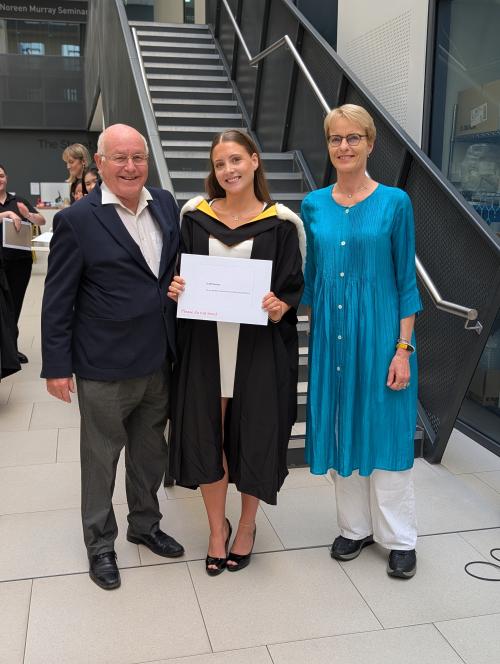
The Sir James Black Award is an annual prize presented by the School of Life Sciences at the University of Dundee to the final year undergraduate student deemed to have made the most outstanding contribution to research during their final year project.
The award is named after Sir James Black, who was awarded a Nobel prize for his discovery of the drugs propranolol and cimetidine, which have transformed the treatment of angina and stomach ulcers. Sir James was Chancellor of the University between 1992 and 2006 and took a deep interest in the growth of the University. The University presents the Awards in memory of his remarkable contribution to science, to society and to the University of Dundee.
Kodi Hunter has received the award in recognition of her outstanding undergraduate research project, which included an accepted publication in the journal FEBS Letters. Under the supervision of Tom Snelling in Sir Philip Cohen’s laboratory, Kodi undertook an ambitious project to elucidate a key step in a recently discovered immune signalling pathway. In this pathway, the bacterial metabolite ADP-heptose, activates a human protein kinase ALPK1 which then phosphorylates the adaptor protein TIFA. This enables TIFA to recruit TRAF2 and TRAF6, the proteins that drive the subsequent events that produce inflammatory mediators to fight the bacterial infection.
Through meticulous experimentation and analysis, Kodi identified a binding interface between TRAF2 and TIFA different from the interface between TRAF6 and TIFA. To do this, Kodi used AlphaFold3, a revolutionary model from Google DeepMind that predicts the 3D structure of proteins. She generated a publication‑quality model predicting the TIFA-TRAF2 interaction and performed experiments to establish that the model was correct. These contributions earned her co-authorship on a paper entitled “Identification of the TRAF2 binding site on TIFA and its role in autophagy”, which was accepted by FEBS Letters on 12 May 2025.
Upon receiving the award, Kodi commented, “I am incredibly grateful to have received the Sir James Black Award and honoured that my work has been recognised in this way, especially given the high standard of research taking place across the School of Life Sciences. I sincerely thank Sir Philip Cohen and Tom Snelling for their invaluable support and guidance throughout my project, and for the opportunity to contribute to such meaningful research.”
Professor Gopal Sapkota in the School of Life Sciences, one of the examiners of Kodi’s research project and oral presentation said “Among all the candidates I was involved in examining, Kodi stood out clearly as the most outstanding. She demonstrated an impressive understanding of her project, the broader field of research, and effectively articulated her data and findings.”
We wish Kodi every success in her future career.

